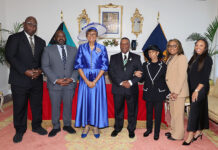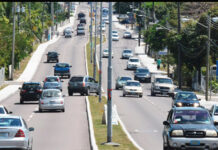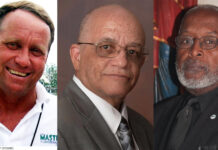 <<< CARICOM heads at the 30th summit of the organization in Guyana.
<<< CARICOM heads at the 30th summit of the organization in Guyana.
GEORGETOWN, Guyana: Caribbean Community Heads of Government may conflict at times over immigration policies of individual states but on Sunday the body reiterated its commitment to the free movement of persons across the region.
At the end of the three-day 30th conference of CARICOM, leaders released a communique that re-affirmed the goal of free movement of persons as expressed in Article 45 of the Revised Treaty of Chaguaramas and agreed that free movement is an essential element of the CSME.
But they insisted that due to `the current global economic and financial crisis,` the full implementation at this point in time of the CSME will be challenging for some member states.
Heads also agreed that migration is a human right though circumscribed by national law and `that in the spirit of the Revised Treaty and the requisites of international law, all migrants should be accorded humane treatment.` They also agreed on the importance of training and sensitizing immigration officers on the implementation of the Region`s approach to free movement and hassle free travel.
Guyana, which chaired the event, had complained loudly in the lead up to the summit, of the treatment of Guyanese in Barbados and the deportation of many.
Prime Minister David Thompson for his part, has cited the global recession as the factor that led to his decisions which was met with strong opposition by fellow CARICOM heads.
The timetable for the implementation of free movement will be decided at the CSME convocation later this year while the CARICOM Secretariat will be tasked with expediting the socio-economic impact study of free movement before Member States sign on to the expansion of household domestics.
Recognition was given to Antigua and Barbuda for maintaining a liberal immigration policy and for recent efforts to streamline its current policies. The heads had agreed to grant Antigua and Barbuda a five-year derogation on the free movement of the `household domestics` category. This will allow the island to make adjustments to its infrastructure to fulfill treaty obligations on free movement.
How soon full implementation will take effect was the question asked by several media representatives who cited lengthy time-lines as the main criticism of CARICOM.
Its Chairman, President Jagdeo, noted, however, that there is often unfair characterizing of CARICOM by critics who fail to realize the magnitude of work needed in implementing policies in the region when compared to a sovereign State.
`For almost everything we have done here, we have a mechanism to follow-up on, including overall governance on our economies,` President Jagdeo said.







